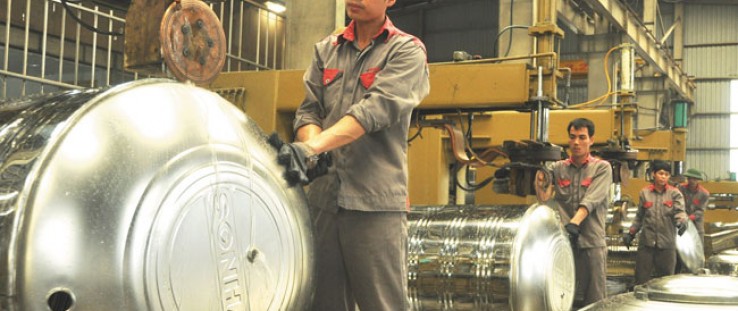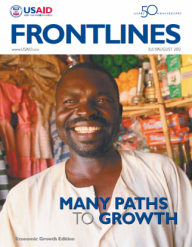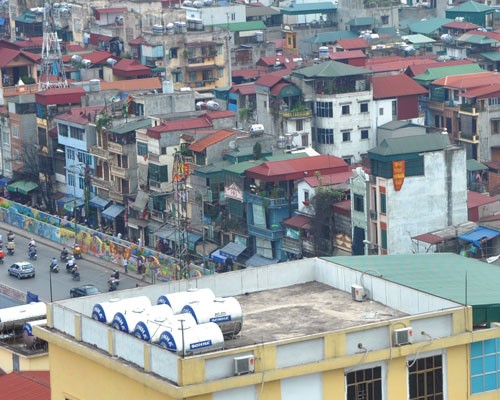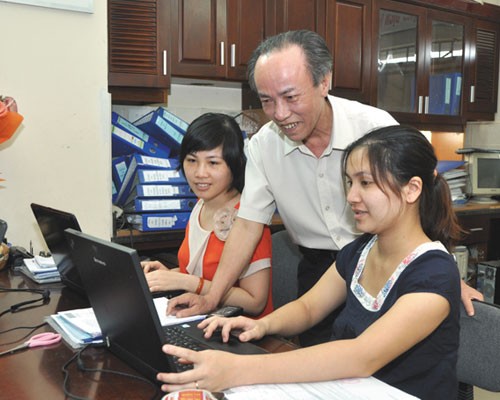 Employees at the Sonha Corporation produce stainless steel water tanks in Hanoi.
You are here » Home » Press » FrontLines » Sign up to receive FrontLines by email Email: First Name: Last Name: RSS Feed for FrontLines Still Want a Paper Copy? Resubscribe here. Front Page Ins
Employees at the Sonha Corporation produce stainless steel water tanks in Hanoi.
You are here » Home » Press » FrontLines » Sign up to receive FrontLines by email Email: First Name: Last Name: RSS Feed for FrontLines Still Want a Paper Copy? Resubscribe here. Front Page Ins
 Employees at the Sonha Corporation produce stainless steel water tanks in Hanoi.
You are here » Home » Press » FrontLines » Sign up to receive FrontLines by email Email: First Name: Last Name: RSS Feed for FrontLines Still Want a Paper Copy? Resubscribe here. Front Page Ins
Employees at the Sonha Corporation produce stainless steel water tanks in Hanoi.
You are here » Home » Press » FrontLines » Sign up to receive FrontLines by email Email: First Name: Last Name: RSS Feed for FrontLines Still Want a Paper Copy? Resubscribe here. Front Page Ins
Hanoi’s skyline is rapidly changing as modern office buildings here, as in other major cities of Vietnam, are rising. Looking down from one of the capital’s taller buildings, one can see shiny new water tanks glistening in the midday sun, perched like bright pods atop buildings big and small.
This is a reflection of Vietnam’s transformation. Twenty years ago, water was stored in heavy brick and mortar containers that leaked and leached cement particles on roofs and into homes across Vietnam.
Back then, the average Vietnamese got by with much less. Over the past two decades, market-oriented reforms have transformed Vietnam’s economic outlook. GDP per capita rose from around $100 in 1990 to $1,400 in 2011, dramatically reducing poverty levels and propelling Vietnam to the ranks of lower-middle-income countries.
In 1998, a new private-sector company, Sonha, found its niche with a successful home-grown solution—lightweight and hygienic stainless steel water tanks. The industry has since boomed, and as the market leader, Sonha now produces about 130,000 tanks a year with factories in Hanoi and Ho Chi Minh City, and ventures in solar power, steel piping, waste treatment and real estate. It recently presented its wares for export at a trade fair in Germany.
The company exemplifies entrepreneurship in Vietnam today, where firms can make informed business decisions, and where the Vietnamese people are reaping the benefits. However, it wasn’t always this way. Back in the brick and mortar days, knowing where to invest and what investors were thinking was often pure speculation. That changed as a result of a partnership between USAID and the Vietnam Chamber of Commerce and Industry (VCCI), and the development of a survey tool for provincial and business leaders like those at Sonha.
Jointly implemented by USAID and VCCI since 2005, the Provincial Competitiveness Index (PCI) is a comprehensive annual survey of Vietnamese firms about the in-country business environment.
It ranks all provinces in the country in terms of transparency and ease of doing business. Few reports covering the private sector receive as much media and industry buzz as the PCI, especially about which provinces come out on top. Over the past two years, the PCI has garnered over 200 media mentions on the front pages of newspapers and magazines and on prime-time news shows, including interviews with provincial, USAID, VCCI and private-sector leaders.
“The PCI helps to improve the business environment to benefit private small- and medium-sized enterprises,” said Dam Quang Hung, Sonha’s deputy director general.
“The way it does this,” said Todd Hamner, director of USAID’s Economic Growth Office in Vietnam, “is by encouraging local governments to become more accountable and transparent as they seek to be well-reflected in this annual survey.”
Strong Reactions
The 2011 version of the index surveyed almost 7,000 Vietnamese businesses across all 63 provinces and major cities. It reflects perceptions of provincial government performance regarding ease of doing business, economic governance, and administrative reform efforts that support private-sector development. The survey drew mixed reactions in the early days.
“The first time the PCI was launched, many provinces, especially the top leaders, reacted to the PCI very strongly, and in some ways, very negatively—especially those provinces ranked toward the bottom,” said Vu Xuan Tien, who has responded to most of the annual surveys and is both the director of VFAM Consulting and head of the Hanoi Lawyer Association. “Before the PCI, there was no benchmark, no measurement whatsoever to provide an overall picture in Vietnam. At that time, normally, when you read an annual report of a particular province, it was always improving, it was always getting better.”
According to Dau Anh Tuan, deputy head of VCCI’s legal department, economic governance at the provincial level was “not given sufficient attention” in the years before the PCI. “People often talked about favorable geographical position, good infrastructure, high-quality labor, [and] large market size as factors that drove investment and competitiveness. With the introduction of the PCI, both local and provincial governments in Vietnam could see that economic governance plays a very important role for investors while considering investment destinations. I think economic governance really matters in helping provinces to become more competitive.”
Even critics have since embraced the survey. “Provinces in Vietnam that formerly reacted negatively to the PCI have turned around, and they have seriously considered the PCI as a useful tool,” said Tien. “They have researched the PCI report carefully and they also look at areas in which they can improve.”
Related Content
VCCI, with support from USAID’s Vietnam Competitiveness Initiative project, has sent the 20-page surveys to over 200,000 domestic firms since 2005 in all 63 provinces and cities. The index measures key indicators on each province’s business-entry costs, land access and security of business premises, transparency, labor training, time spent on administrative procedures, quality of provincial leadership in solving problems for enterprises, and other issues of importance to businesses.
“The PCI provides valuable information to different audiences, both in and outside of government, including central and provincial government leadership, potential investors, researchers and donors,” said USAID/Vietnam Mission Director Francis Donovan. “Many now look forward to the annual PCI report and its reflection of current economic governance and transparency across Vietnam and how it changes from year to year.”
U.S. assistance through the PCI and other activities has contributed to the Government of Vietnam’s regulatory and market-opening reforms that underpin Vietnam’s economic progress and expand trade and investment opportunities for U.S. businesses, benefitting both Vietnamese and Americans. In 2011, bilateral trade between the United States and Vietnam reached nearly $22 billion, and U.S. exports to Vietnam grew 17 percent.
Report Card for Provinces
At the provincial level, the PCI provides information on where a province is excelling in economic governance, and on where improvement is needed. Rankings can help leaders improve future performance. For investors and businesses, it provides valuable information regarding business climates. For the international donor community, it is helpful in monitoring the progress of reforms and understanding the development needs of different provinces. Researchers use the rich PCI data for analysis, research and publications.
Generally, provinces are performing better since the tool was launched in 2005. The 2011 results show that the difference in scores between the top and the bottom provinces has narrowed greatly after only a few years, with only one province ranked in the “mid-low” range.
The work really starts once the annual rankings are announced and each province sees how it has fared. USAID’s project team then presents findings and analysis at diagnostic workshops—at the request of provincial leaders and with the participation of local businesses—to analyze results and discuss ways to improve performance.
In 2010, for example, Quang Ninh province hosted a live webcast conference with nine remote districts to review and improve on its score. Over 30 provinces have issued directives, action plans and resolutions on ways to improve the business environment.
Tuan, of VCCI’s legal department, noted that some provinces have established a PCI task force headed by high-ranking leaders. “Binh Phuoc went from 49th spot in 2007 to earn a position in the top 10 in 2011. Some provinces, like Ba Ria-Vung Tau, carry out training courses annually for government officials at district and commune levels,” he said.
The province of Lao Cai has steadily climbed the PCI rankings, and currently is in top place. Lao Cai created its own website to highlight transparency and other governance issues, and understands what it takes to stay in first position. “If you ask me if we feel pressure being at the top of the PCI ranking, frankly, I would say ‘yes,’” said Nguyen Van Vinh, chairman of Lao Cai People’s Committee. “It is important that we maintain our level of competitiveness and ease of doing business in Lao Cai, and fulfill well our role as provincial leaders.”
There have been some remarkable changes in performance. Ha Tinh province jumped from 37th place in 2010 to 7th place in the rankings following changes in regulations and with increased efforts to improve transparency, while Binh Dinh slid 18 positions, from 20th to 38th place.
The PCI 2009 report notes that a one-point improvement in the PCI transparency score is associated with a 17 percent improvement in investment per capita for the average company.
Businesses Benefit
Perhaps the most important result of the survey tool is that businesses are seeing direct benefits from reforms put in place following PCI diagnostic workshops.
“I think the business environment of Ninh Thuan has improved over the past year,” said Tran Dinh Minh, director of Nam Thanh Construction and Production Co. Ltd., a recycling company that produces plastic, rubber and packaging material for the local market in southern Vietnam. “The establishment of the Economic Development Office is a great way to centralize all licenses regarding foreign and local investment in a one-stop shop that has made it a lot easier to do business. We are seeing improvements in areas such as business registration, time for administrative procedures and a dynamic commitment of local leadership.”
In 2011, the PCI team also surveyed nearly 2,000 foreign companies with investments in 61 provinces in Vietnam to help identify challenges for building a competitive economy with growth of foreign and domestic enterprises. Key findings from that survey revealed that, despite increased revenues in 2011, there was greater pessimism among foreign companies operating in Vietnam for the next two years due to global economic challenges as well as high inflation and a perceived inefficiency of Vietnam’s financial system. Foreign investment in the country accounts for approximately 19 percent of Vietnam’s GDP.
Just as the PCI survey results inform government about domestic private-sector concerns, the survey of foreign companies also provides important information about international investor concerns.
“Results of the foreign-invested firm survey confirm our concerns about decreasing optimism among the FDI [foreign direct investment] community for business prospects in Vietnam in the near future,” said Alain Cany, chairperson of the European Chamber of Commerce of Vietnam. “Eurocham looks to the Vietnamese Government for stronger reform commitments to improve the local business environment and sustain the country’s impressive economic growth.”
Creating an attractive investment climate is about promoting a proactive, supportive culture within government that works directly with the private sector. The engagement and support of provincial and business leaders over the last seven years demonstrates their belief that the PCI is a valuable tool that informs Vietnam’s entrepreneurs and officials on important governance issues.
Dam Quang Hung, Sonha’s deputy director general, is banking on the confident, collective voice of his peers through the annual survey. “We use the PCI as a reference to measure changes and the ease of doing business in cities and provinces,” he says. And for Sonha and so many other companies, investing in Vietnam has become easier now that provincial leaders and the private sector are listening to and working with each other to make Vietnam a better place to do business.












Comment
Make a general inquiry or suggest an improvement.